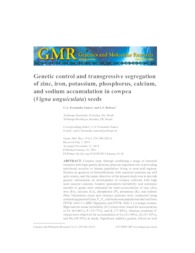Genetic control and transgressive segregation of zinc, iron, potassium, phosphorus, calcium, and sodium accumulation in cowpea (Vigna unguiculata) seeds.
Genetic control and transgressive segregation of zinc, iron, potassium, phosphorus, calcium, and sodium accumulation in cowpea (Vigna unguiculata) seeds.
Author(s): SANTOS, C. A. F.; BOITEUX, L. S.
Summary: Cowpea crop, through combining a range of essential minerals with high quality proteins, plays an important role in providing nutritional security to human population living in semi-arid regions. Studies on genetics of biofortification with essential minerals are still quite scarce, and the major objective of the present study was to provide genetic information on development of cowpea cultivars with high seed mineral contents. Genetic parameters heritability and minimum number of genes were estimated for seed accumulation of zinc (Zn), iron (Fe), calcium (Ca), phosphorus (P), potassium (K), and sodium (Na). Generation mean and variance analyses were conducted using contrasting parental lines, F1, F2, and backcross populations derived from IT97K-1042-3 x BRS Tapaihum and IT97K-1042-3 x Canapu crosses. High narrow-sense heritability (h2) values were found for accumulation of Fe (65-86%), P (74-77%), and K (77-88%), whereas moderate h2 values were observed for accumulation of Ca (41-56%), Zn (51-83%), and Na (50-55%) in seeds. Significant additive genetic effects as well whereas epistasis was important genetic component in Zn content. The minimum number of genes controlling the accumulation of minerals ranged from two (K) to 11 (P). Transgressive segregation was observed in F2 populations of both crosses for all minerals analyzed. The results suggest that, although under either oligogenic or polygenic control, the seed content of these six minerals in cowpea can be improved via standard breeding methods largely used for self-pollinated crops.
Publication year: 2015
Types of publication: Journal article
Unit: Embrapa Vegetables
Observation
Some of Embrapa's publications are published as ePub files. To read them, use or download one of the following free software options to your computer or mobile device. Android: Google Play Books; IOS: iBooks; Windows and Linux: Calibre.
Access other publications
Access the Agricultural Research Database (BDPA) to consult Embrapa's full library collection and records.
Visit Embrapa Bookstore to purchase books and other publications sold by Embrapa.

